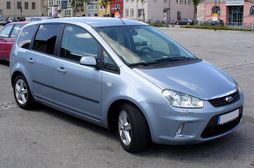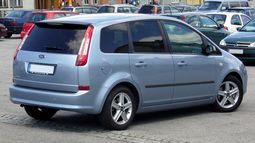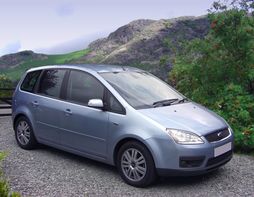The History Of FORD C-max

The Ford C-Max is a compact MPV produced by Ford in Saarlouis for the European market since 2003. It was the first to use the Ford C1 platform, also used by the Ford Focus Mk II, which was introduced a year later, and the compact MPV Premacy/ Mazda5. With the introduction of the new large MPVs S-Max and Galaxy, the C-Max is the smallest multi-purpose vehicle of Ford's lineup. Its internal code name is C214.
In December 2006, the facelifted version of the C-Max was revealed at the 2006 Bologna Motor Show and went on sale in late spring 2007. The facelift brought the car in line with Ford's 'Kinetic Design' design language, evidenced through its twin trapezoidal grilles, large wheelarches and angular headlights. However, as the car does not have a bodyshell originally designed for 'Kinetic Design,' Ford officially states that the car contains only 'elements' of the design language.
It seats five passengers and has a large amount of cargo space, which can be increased by folding the rear seats flat. Some models feature diagonally sliding outer rear seats. It also shares the control blade independent rear suspension from the Focus.
The available engines are the same as the Focus — the petrol versions are the 1.6L, 1.8L and 2.0L aluminium Duratec, and the 1.8L Duratec Flexifuel, which runs on E85 bioethanol or petrol, while the diesel engines are the PSA-developed Duratorq 66kW (90hp) and 85kW (109hp) 1.6 (1560cc)L, Ford's own Lynx Duratorq 1.8L 85kW (115hp), and the PSA-designed 100kW (136hp) 2.0L.
In the United Kingdom, the car is available in Studio, Style, Zetec and Titanium trim levels.
The pre-facelift version of the car (2003-2007) was called the Ford Focus C-Max. The name change to C-Max is attributable to Ford's MPV strategy of creating a 'Max' branded line of MPVs, starting with the Ford S-Max, launched in 2006.
From Wikipedia, the free encyclopedia
More About FORD C-max



|